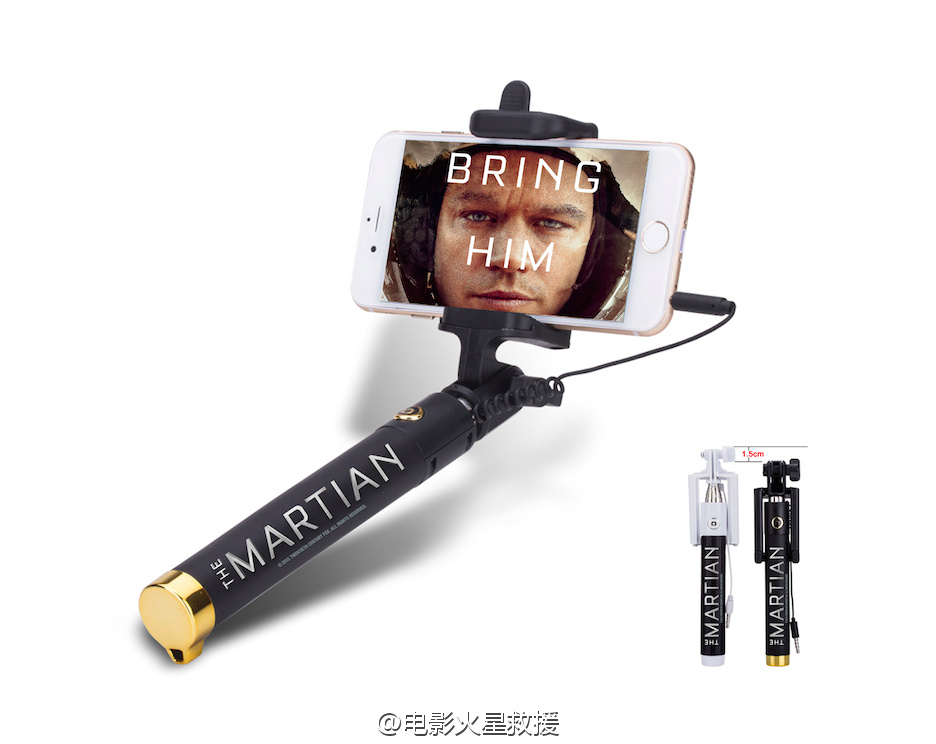At the end of a spell of underperforming Hollywood imports that led to November tallying the lowest monthly box office total of the year thus far, The Martian (火星救援)—with its combination of cool, cutting-edge science and old-fashioned, high-wattage star power—struck a chord with Chinese moviegoers over the final weekend of the month, grossing $48.4 million in the first five days since its debut on Wednesday, November 25, according to Artisan Gateway. (Studio 20th Century Fox reported the tally at $50.1 million.)
November was the last full month of 2015 during which revenue-sharing imports were licensed to be released in China before the start of another blackout period after this week, when The SpongeBob Movie: Sponge Out of Water and Point Break will be the final Hollywood films to make the cut this year. Many of the earlier revenue-sharing imports from Hollywood dotting the release calendar proved disappointments, failing to break out in the world’s second largest film market. These included Everest ($16 million), Maze Runner: The Scorch Trials ($30.7 million), The Peanuts Movie ($5.7 million), and The Hunger Games: Mockingjay—Part 2 ($21.5 million). November’s box office receipts totaled $415 million, a 14% increase over the gross tallied in November 2014, but lagging well behind the near 50% increase in revenues seen in the first half of the year.
Even the Bond juggernaut Spectre—which grabbed headlines after its $49 million debut weekend amid a splashy marketing campaign—plummeted 75% and 81% in successive weekends as it was plagued by awful word of mouth.
Surely some of the blame can be cast upon China’s Distribution and Exhibition Association, the subsidiary of the State Administration of Press, Publication, Radio, Film, and Television (SAPPRFT) that is solely in charge of setting release dates. The Distribution and Exhibition Association has been especially unkind to revenue-sharing films since September, when Mission: Impossible—Rogue Nation, Minions, and Pixels all were released in the span of one week, cannibalizing each other at the box office. The busy November release calendar made a little more room, but not much, for Hollywood films to enjoy their moments in the limelight.
More telling is the fact that November’s Hollywood releases failed to resonate with Chinese audiences. On Douban—a Chinese review site similar in spirit to RottenTomatoes, featuring both audience and critics’ ratings—Spectre and Mockingjay—Part 2 currently hold average ratings of 6.2/10 and 6.3/10, respectively, among the lowest for imported films all year. The MPAA’s complaints about unfair treatment in the Chinese market will become increasingly irrelevant if Chinese moviegoers continue to turn a cold shoulder to what they’re being offered.
The Martian entered into this frigid November box office climate with high expectations fueled by its China-friendly storyline and the Hollywood science-fiction genre’s popularity among audiences—Gravity earned $71 million in 2013 and Interstellar grossed $122 million last year. It did not disappoint.
The Matt Damon vehicle enjoyed a strong marketing campaign in China, with online buzz building since its North American release in early October. The Martian kicked off its official Weibo account on November 5, drawing nearly 40,000 followers, and its star-studded Beijing red-carpet premiere featured director Ridley Scott along with Damon and performers Sebastian Stan, and Chen Shu, as well as a promotional tie-in with Lexus. Shortly after the premiere Stan, whose Chinese fame has been on the rise since Captain America: Winter Soldier, created a personal Weibo account that amassed more than 100,000 followers in two weeks.
Filmgoers bestowed The Martian with a rating of 8.5/10 on Douban, the highest of any Hollywood release this year, which should ensure a long and successful run. User Summer gave the film a perfect 10, explaining how it was better than Interstellar: “The plot was tighter and grounded by reason without any manufactured plot shifts or parts that deliberately manipulated my emotions.” (One wonders if she was immune to the plot twist that saw the Chinese space program save the day). User CaoDuo was enamored with astronaut Mark Watney: “I love this kind of amusing, self-confident, and optimistic geek! Science is soooooo sexy that afterwards I went out to my balcony and planted potatoes!”
Did China’s pivotal role in rescuing Watney help bolster The Martian’s box office success? Crowd reports indicate that the loudest laughs came when China National Space Administration (CNSA) stepped in to rescue NASA’s stranded American. In a review titled “China Not Only Saved Matt Damon, But Also the American Film Industry,” the author wrote that he thought the laughter in his theater originated from the view that “evil American imperialism finally got its just desserts and had to rely on China when it couldn’t save one of its own.” Yet he also readily admits that the laughter may have been directed towards the CNSA bureau chief, played by a Hong Kong actor, whose Mandarin was twinged with a Cantonese accent.
The Martian’s strong performance in China and at the global box office ($545 million worldwide to date) will please Bona Film Group, the Chinese studio that recently committed $235 million for a slate of six Hollywood films from 20th Century Fox, and will receive 20% of The Martian’s global revenues as a result of the investment. After Nasdaq-listed Bona’s disappointing third quarter results stemming from weak domestic releases, its foray into the global film industry is a sign to some Chinese industry watchers of the importance of diversification, and could position the company to become a major distributor of flat-fee imported films if restrictions are lifted.
—Follow Jonathan Papish on Twitter @ChinaBoxOffice.
(This story was updated at 9:15am ET, Tuesday, December 1).






